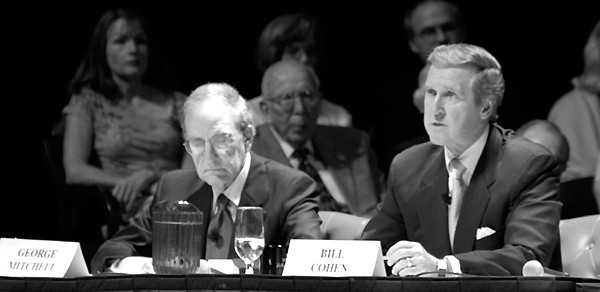
Defining a role for America
Former Secretary of Defense Bill Cohen and former Senatemajority leader George Mitchell agreed that they thought of whatterrorists could do gave them greater nightmares than any they hadever encountered when facing nations at war.
The former political leaders discussed opened the current localand global political tensions in the war on terrorism Wednesdaynight in McFarlin Auditorium to open the 2003-2004 Tate LectureSeries.
“This lecture series is especially timely in light of thechallenges facing us today between the situation in North Korea,Iraq and the upcoming elections,” SMU President R. GeraldTurner said at the beginning of the night.
“These gentlemen have advised presidents and forged peacetreaties. We are pleased to have them with us tonight.”
The Linda and Mitch Hart Lecture “American Leadership inToday’s World,” which was taped for broadcast onC-SPAN, covered various topics, such as the war in Iraq andnational security in the aftermath of Sept. 11.
Mitchell, who served in the Senate from 1980 to 1995 and hasnegotiated peace treaties with various foreign countries, saidbecause of Sept. 11, “most Americans [had] been secure in thethought that we were secure between our two continents, isolatedfrom harm. I believe that notion is now firmly destroyed,”Mitchell said before the audience of 2,300.
Cohen, who served as U.S. Secretary of Defense from 1997 to2001, said that it was the nature of a threat of attack that wasthe most devastating.
He said that the other countries of the world know that thereare over 6,000 nuclear missiles ready to be launched at amoment’s notice and would hesitate to start a war knowingthere would be no benefit to the total destruction of bothnations.
“It’s the lone terrorist with black-market weaponsthat we have to fear,” Cohen said. “We have done a lotto stop that possible threat with the tax dollars that you pay tofeed other countries.”
Both men said that it was entirely too easy and very possiblefor a terrorist to come in say through the Gulf of Mexico andattack some place in Texas.
“The only thing that can be done is for the president toappeal to other governments and shipping agencies to control thecontents of their ships,” Cohen said. “To try to stopand inspect every ship ourselves would have transportation boggledaround the world.”
Concerning the war in Iraq, both men said that they were notsure what evidence President Bush had that made him decide toattack Iraq.
They might have endorsed the policy or argued for continuedcontainment, but it all depended on what the situation was and whatkind of a threat we really faced.
They both refused to “second guess thePresident.”
Both men said that the United States should require othercountries to pay more of the defense bill, as they promised, andthat Iraqi troops and police should be trained to protect Iraq.
They also believe that President Bush was correct in refusingthe French president’s demand that all control is turned overto France immediately and that the United States should gohome.
“The French government and the others know that a gradualtransfer of power would be necessary in order to preventconfusion,” Mitchell said. “I believe they intendedthat as an opening gambit at negotiation and we took it[literally.]”
Mitchell said that many of the allies and other countries of theworld do not hate us, as we believe.
They just feel that we are too arrogant and isolationist.
When Bush pleaded for help from other countries before theUnited Nations this week, that was exactly what was needed tosoften foreign attitudes towards us, Mitchell said.
“One thing to remember,” Cohen said, “is thatit doesn’t matter how politically stable a government may beor how intolerant when the people of a nation arehungry.”
Cohen said that it is the economic stability of a country thatwill determine whether it goes to war, and our tax relief effortsgo a long way to helping to keep the world from exploding in apowder keg of rage and hunger.
Other people just want a job to feed their families and a safeplace to raise them, just like us.
As the floor was opened for dialog, Mitchell told the audience,”The course of peace cannot be pursued by the weak or faintof heart. Also peace is always bought at a price. We each have todecide what that price is that we are willing to pay.”








